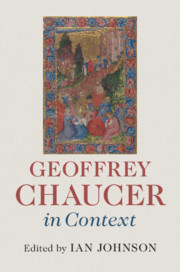Book contents
- Geoffrey Chaucer in Context
- Geoffrey Chaucer in Context
- Copyright page
- Contents
- Illustrations
- Contributors
- Abbreviations
- Introduction
- Part I Chaucer as Context
- Part II Books, Discourse and Traditions
- Chapter 3 Chaucer’s Linguistic Invention
- Chapter 4 Chaucer and London English
- Chapter 5 Manuscripts and Manuscript Culture
- Chapter 6 Chaucer’s Books
- Chapter 7 Authority
- Chapter 8 Literary Theory and Literary Roles
- Chapter 9 Metre and Versification
- Chapter 10 Dialogue
- Chapter 11 Romance
- Chapter 12 Love
- Chapter 13 Chaucer and the Classics
- Chapter 14 The French Context
- Chapter 15 The Italian Tradition
- Chapter 16 The English Context
- Chapter 17 Chaucer’s Competitors
- Chapter 18 Boethius
- Part III Humans, the World and Beyond
- Part IV Culture, Learning and Disciplines
- Part V Political and Social Contexts
- Part VI Chaucer Traditions
- Further Reading
- Index
Chapter 13 - Chaucer and the Classics
from Part II - Books, Discourse and Traditions
Published online by Cambridge University Press: 24 June 2019
- Geoffrey Chaucer in Context
- Geoffrey Chaucer in Context
- Copyright page
- Contents
- Illustrations
- Contributors
- Abbreviations
- Introduction
- Part I Chaucer as Context
- Part II Books, Discourse and Traditions
- Chapter 3 Chaucer’s Linguistic Invention
- Chapter 4 Chaucer and London English
- Chapter 5 Manuscripts and Manuscript Culture
- Chapter 6 Chaucer’s Books
- Chapter 7 Authority
- Chapter 8 Literary Theory and Literary Roles
- Chapter 9 Metre and Versification
- Chapter 10 Dialogue
- Chapter 11 Romance
- Chapter 12 Love
- Chapter 13 Chaucer and the Classics
- Chapter 14 The French Context
- Chapter 15 The Italian Tradition
- Chapter 16 The English Context
- Chapter 17 Chaucer’s Competitors
- Chapter 18 Boethius
- Part III Humans, the World and Beyond
- Part IV Culture, Learning and Disciplines
- Part V Political and Social Contexts
- Part VI Chaucer Traditions
- Further Reading
- Index
Summary
Chaucer’s literary imagination is fuelled by a highly mediated and contextualised access to his classical sources, almost always supported by, filtered through, or read against the vernacular works of European contemporaries. He is a cultural synapse between Latin literature and the vernaculars of medieval Europe. Chaucer’s classical knowledge was a bricolage made up of direct knowledge of some Latin works (especially those of Ovid and Virgil); some knowledge of Latin works supported by translations or commentaries in the European vernaculars in which he was comfortable, especially French and Italian; and some knowledge of vernacular reworkings of earlier Latin materials which he was able to finesse and nuance by referring back to the Latin originals. Throughout the House of Fame, a key text for his literary self-awareness, Chaucer imaginatively explores his own understanding of, and relationship to, antecedent literature, and particularly to the literature of Latin antiquity as it had survived into his lifetime.
Keywords
- Type
- Chapter
- Information
- Geoffrey Chaucer in Context , pp. 106 - 116Publisher: Cambridge University PressPrint publication year: 2019

